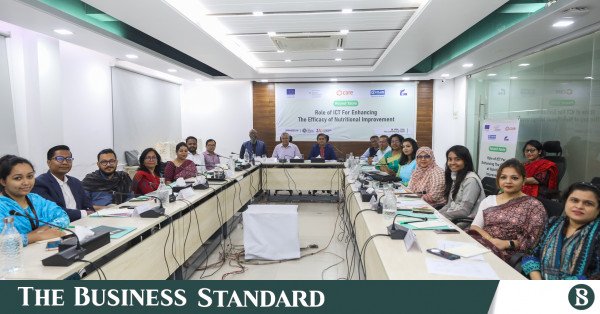The conference was co-hosted by Joint Action for Nutrition Outcome (JANO) and The Business Standard to discuss the positive impact of using ICT on improving nutrition through the JANO project.
Distributing nutrition information to marginalized populations through ICT is feasible and could play a role in improving the nutrition situation in Bangladesh, says Sunday’s “The Role of ICT in Boosting the Effectiveness of Nutrition Improvement.” said experts at a roundtable discussion.
The conference was co-hosted by Joint Action for Nutrition Outcome (JANO) and The Business Standard to discuss the positive impact of using ICT on improving nutrition through the JANO project.
Experts believe that with the JANO project coming to an end this year, its work will need to be replicated across the country to improve the country’s nutritional situation.
Dr. Ikhtiyar Uddin Khandaker, Director (Health and Nutrition) of CARE Bangladesh, said, “ICT can change the nutritional behavior of marginalized people. The learnings should be applied across the country. The government, especially the Bangladesh National Nutrition Council (BNNC), should take the lead in utilizing these in the Third National Action Plan on Nutrition.” Stated.d. Mr. Toufiqur Rahman, ICT Consultant – M&I, JANO, presented the progress of project efforts and ICT-based interventions. JANO focused on improving the nutritional status of pregnant women, children under five years of age, and adolescents in her 14 upazilas of Rampur and Nilphamari districts.
JANO’s key ICT interventions include a multi-sectoral online monitoring and evaluation system, currently used by trained government officials in 14 districts and expanded to 44 districts nationwide .
Also includes eLearning and eSession apps for service providers. These apps have reached over 300,000 people with nutritional information and have registered over 800 frontline workers and volunteers. Additionally, these tools facilitated his more than 8,300 courtyard sessions.
JANO also provided talking books, and more than 400,000 people received nutritional information. Field workers also visit villages and convey messages about nutrition through songs.
Dr. Shabnam Mostari, Public Health Expert and Director, Aspire to Innovate (a2i) said, “JANO has reached 1.48 million people in hard-to-reach areas using ICT. Through these solutions, we can identify risk factors and improve nutritional status.” . ”
Dr. Farzana Rahman, Deputy Director of BNNC, said, “Once JANO’s data is integrated into the SDG Tracker, it will be even more valuable in tracking progress.”
CARE USA Senior Technical Advisor (Knowledge Management and Research, Food and Water Systems (FWS) Unit, Food Security and Resilience Team) Tahmina Haque said, “Planning, monitoring and coordination are key. There needs to be a plan for the government to take over JANO’s web platform and e-apps after the project ends.”
Dr. Asif Ferdous, Health and Family Planning Officer, Gangachala, Rangpur, said, “ICT can reduce maternal and child mortality. “We need continued ICT support to address human resource and technology shortages in the region.” It’s a government hospital. ”
Saika Siraj, Bangladesh Nutrition International Country Director, said: “Despite the decline in undernourishment, malnutrition remains a challenge. We need to focus on that.”
Tony Michael Gomez, CARE Bangladesh Director (Communications and Advocacy), said, “ICT can help address the double burden of malnutrition and overnutrition and food waste. We need to utilize ICT for this purpose.”
Rumana Sharmin, UNDP Bangladesh Research Analyst, said, “While there are many good initiatives like the JANO ICT intervention taking place in both the government and non-government sectors, there is still a need to move forward in line with the SMART Bangladesh vision. All that is needed is effective alignment, connectivity and integration.The roundtable discussion was moderated by Sazzadur Rahman, Deputy Editor, The Business Standard, and Zaki Haider, Director of Innovation, mPower Social Enterprises Ltd, Digitization – Large. Nandinee Chowdhury, Project Manager, Scaled Food Fortification (LSFF), GAIN, Nilphamari District Livestock Officer Dr. Sirajul Islam, Suchana were present. Dr. Shahed Rahman, Program Team Leader and CSA-SUN Bangladesh Secretary, United Purpose Bangladesh Project. Director Jannat Noor and others.

